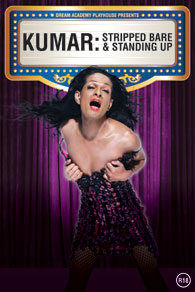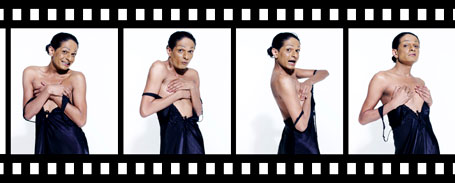Arguably Singapore's most famous gay icon, Kumar made his name as a drag queen comedian back in the early 1990's at now-defunct comedy and dance club the Boom Boom Room. In a time when people barely dared to speak about queer issues or politics, he cracked the most outrageous jokes about sex, race and government, in between sets of lip-syncing, traditional Indian dance routines and hunky go-go boys.
Today, he's a household name, familiar to and beloved by people gay and straight alike (although of course, us gays have been always his biggest fans). Besides his comedy nights at 3 Monkeys and Hard Rock Cafe, he also appears on TV and in plays, and was even featured as the focus of Kumar: The Queen, a mega-production by Dream Academy in 2007.
Yet consistently, throughout his countless media interviews, Kumar has never publicly come out. Sure, he jokes about his sexuality non-stop on stage, but up till now, he's never put words to paper to declare he's gay.
We're saying "up till now," of course, because we asked him. And surprise, surprise: he said yes, he's gay and either we are "blind" or "can't smell it."
It's a moment of frankness that's befitting of his upcoming performance: Kumar: Stripped Bare and Standing Up, which will be playing from Thursday, 19 to Saturday, 21 March at the Esplanade Theatre. Because although there's going to be plenty of Kumar's regular brand of crass, wicked humour, this time it'll take on a personal note.
Because in this show, Kumar will be telling his life story: his struggles with society and authority in Singapore, moving from school to army to 17 years of showbiz, always the odd man (or drag queen) out. There won't be a chorus of go-go-boys or girls either: it's just going to be him and the naked truth.
I think it's going to be good. Interviewing him after rehearsals, I realise I've always categorised him as a diva and star performer without considering the intelligence that's behind his comedic routines, nor the wisdom he's had to cultivate to negotiate censorship and conservatism in Singapore.
So even if you've seen Kumar a thousand times before, I believe it's worth checking him out again at this show. He's spent the last two decades telling us what he thinks of Singapore; now, finally, he's going to talk about himself.

Kumar: I think everybody else is afraid to say it. But why state the obvious? It's either you're blind or you can't smell it. But now (being) gay is not an issue, because people make fun of other issues. It's no longer, "Wow, alternative lifestyle" anymore. Too many already.
æ: So tell us about this show.
Kumar: It's a lot about my life, my family, and what I had to do to prove to people that being different doesn't mean I'm abnormal. Ninety percent of everything - actually, everything is from me. Nothing is made up. Everything is just real.
But it's not a like, "Oh my god, so poor thing" story. It's funny lah - we always think when we are young, we go through a lot of shit, but when you grow older and get over it, you think it's quite funny. When you get outside you realise it's actually quite funny - and great material for standup.
æ: Why are you doing this now?
Kumar: I just turned 40, so I think it's an age where people will take you a bit more seriously. And it's just me alone. Me, myself and I. Bengawan solo. Soul train. I've never done Esplanade alone. I'm ready to do that now.
æ: I'm curious about your beginnings in showbiz. When did you first start performing?
Kumar: I started dancing when I was 6 years old. But that'll all be in the show lah.
æ: I heard you also used to work in Haw Par Villa theme park?
Kumar: That was like, 1989. But that wasn't drag! Gurmit [Singh], Koh Chieng Mun, me, Norleena Salim... all of us were in the same breed, we were all in Haw Par Villa; that was the only place we could learn singing and dancing.
And [the theme park] was all about Chinese mythology, so usually we Indians would play ghosts or dark guardian spirits. Got white face, black face. I was Winter, because I had to act very old.
æ: So how did you start doing drag and comedy?
Kumar: It was 1991, at Laughs Comedy Club, at Tanglin Shopping Centre, which closed down. I was offered the chance to do a stage performance playing an Indian drag queen from S$40 (US$26) a night. And I needed the money so I just went ahead lah.
It was a stand-up scripted from A to Z, including the comma and the full stop. We had three different characters: me, Koh Chieng Mun and Caroline Fernandez. I was't supposed to play but the person couldn't make it, so I just went for the audition and I got it. So I was juggling between Haw Par Villa and that.
Yah, it was very fast. Like in 1992, when I was in Laughs, Dick Lee started the Boom Boom Room and I wanted to leave Haw Par Villa. And I was three months down Boom Boom Room when I was offered to do The Ra-Ra Show [a TV comedy show]. Before I could digest I'm on TV already. Suddenly too big already. Too big. Everything happened too fast you see.
æ: Did your style of performance change?
Kumar: Very much so. Because when I first started I was just very clean and green - 'cos we had the police behind our backs, we had to be careful what we were say. Like the army term: "Do what you want to do, just don't get caught."
I was very careful at the beginning because we had no directions but eventually I just started pushing the boundaries, like from wearing sequined pants to a sequined dress. Like Singapore, you can't push the boundaries overnight. It takes years, but if you do it the right way, you will get there.
æ: Wow. I'd forgotten that drag performance was more or less banned back then. Did the police ever give you trouble?
Kumar: Not really except for one time when I was wearing a sequined dress and they said is that a dress? I said, "Yeah-no…" They randomly come and check mah, they see you suddenly on stage wearing them and (gasp).
The law has not changed but it's been easier. It's not enforced, as long as you don't appear in public, onstage in a shopping centre in drag.
æ: Were you doing similar things with your comedy routines in The Ra-Ra Show?
Kumar: No, no, I couldn't do anything because we were scripted. You can't even adlib you can't adlib much because it's the camera that's involved. So whatever you rehearse you have to repeat it at night.
But there was one part. We started pushing boundaries too early. Like making fun of the Speak Mandarin Campaign wasn't as bad as the joke about people mixing up their seatbelts - "You put your one in my hole."
And Singlish became a big issue. All the parents said, 'Our children are learning the wrong English.' And the parents always forget there's such a thing as a switch-off button. Or a change-channel button. We're not so poor that we only have one channel.
After Ra-Ra Show I was banned from TV. Because it became controversial. Not because of me, I didn't write the jokes, but Indians always get the blame. You know they have to blame one of the odd ones out. It took me eight years to get back on TV.
And personally I feel what also stirred the shit was that we were the pioneers of local TV in those days, and all the hosts of the five programmes were non-Chinese.
æ: Do you feel audiences have changed now?
Kumar: Yes, definitely. Audiences today are very ready for in-your-face humour. I think it's the times, and the influence of the media everything that's around us. In those days you can't do a couple of things - people got very offended - that's racist or. Nowadays there's other things to worry about - a Merlion gets chipped off, there could be a rapist running on the loose, these A-list students chop up their professors just because they didn't get their grades.
I don't think there was a turning point - we gradually moved, you see. You just have to follow what's happening in Singapore - this is the time to bring this up - and as long as when you slam the government, you give your views but you don't take over, you don't actually say, 'This is what they should do,' you can get away with it.
Humour is the only way you can make this happen. With humour you can actually get away with murder also. Mad people can kill and they still don't consider them murderers.
æ: Let's talk about your more recent TV work in shows like My Sassy Neighbour, Oh Carol, and Front. Which show have you enjoyed making the most?
Kumar: It's called Rusiyo Rusi. It's a travel and cooking programme for Vasantham [Singapore's Mediacorp's Tamil language channel] and I'm preparing to do my third season. The first two seasons I did India and Malaysia. Now I'll do the Middle East.
It was really fun, because I was just being myself and I didn't have to put up an act, and the Indians accepted me even though my Tamil is crap. Surprisingly, for that programme I won Best Host for the Indian TV awards. We always think that our audience is not ready but in fact they're always ready - we're just scared to come out of the box.
æ: What's it been like handling your fame?
Kumar: It's been great. I love the limelight because by horoscope I'm a Leo and by Chinese horoscope I'm a monkey.
æ: Do you have any other projects coming up?
Kumar: I'm doing Sing Dollar next. It's a musical by Dream Academy about the crisis. Selena Tan and Sebastian Tan are writing the script. I'm playing a Bangladeshi dishwasher: a straight man, not drag. It's about people in Singapore from different walks of their life coming to together around one thing: money.
Dream Academy presents 'Kumar: Stripped Bare and Standing Up' at the Esplanade Theatre from Thursday, 19 to Saturday, 21 March 2009. Tickets from Sistic.
Kumar also performs on Friday and Saturday nights at 3 Monkeys Café, #01-20 Orchard Towers, as well as on Monday nights at the Hard Rock Café.

